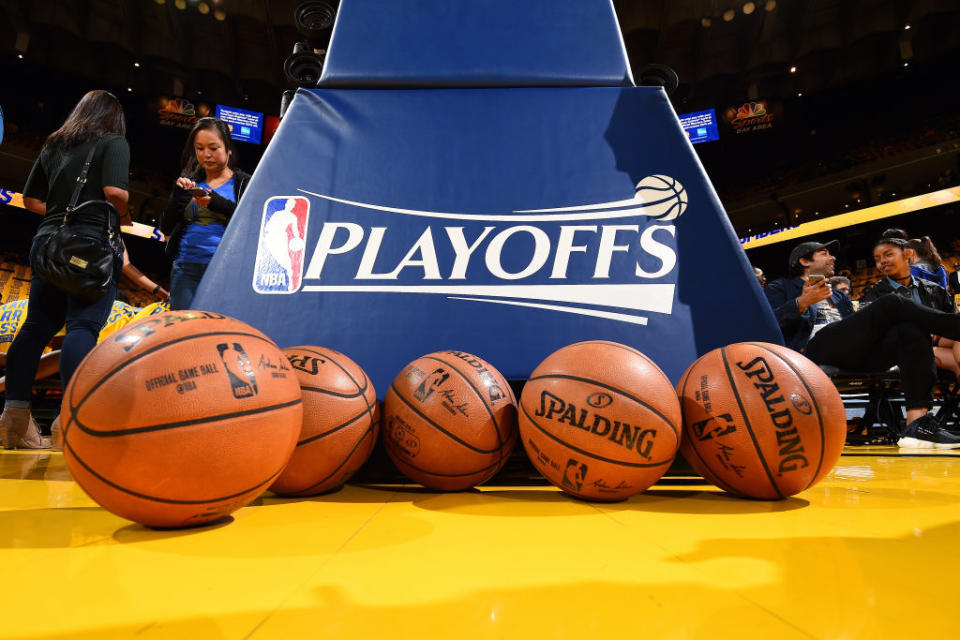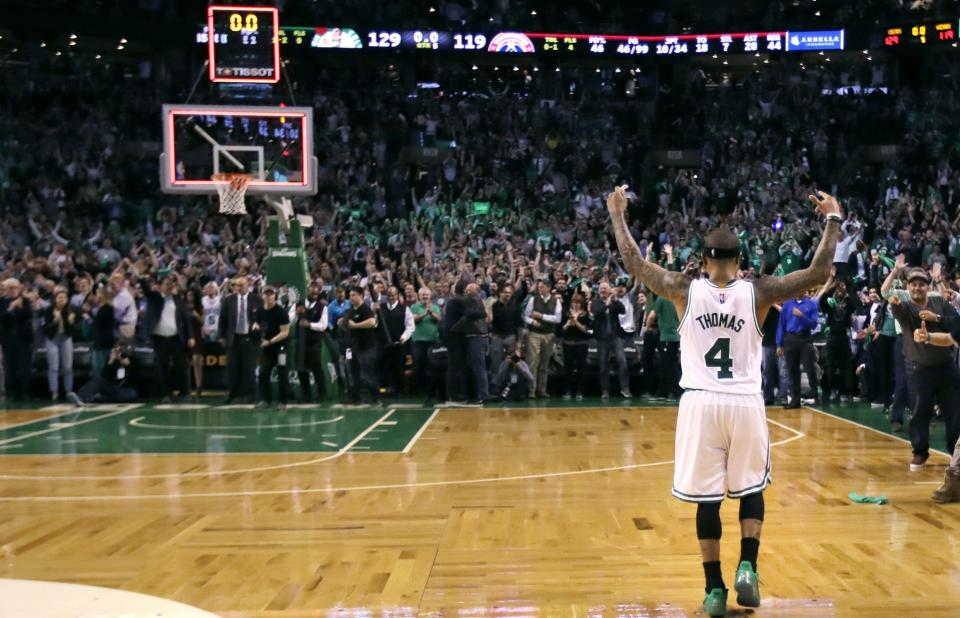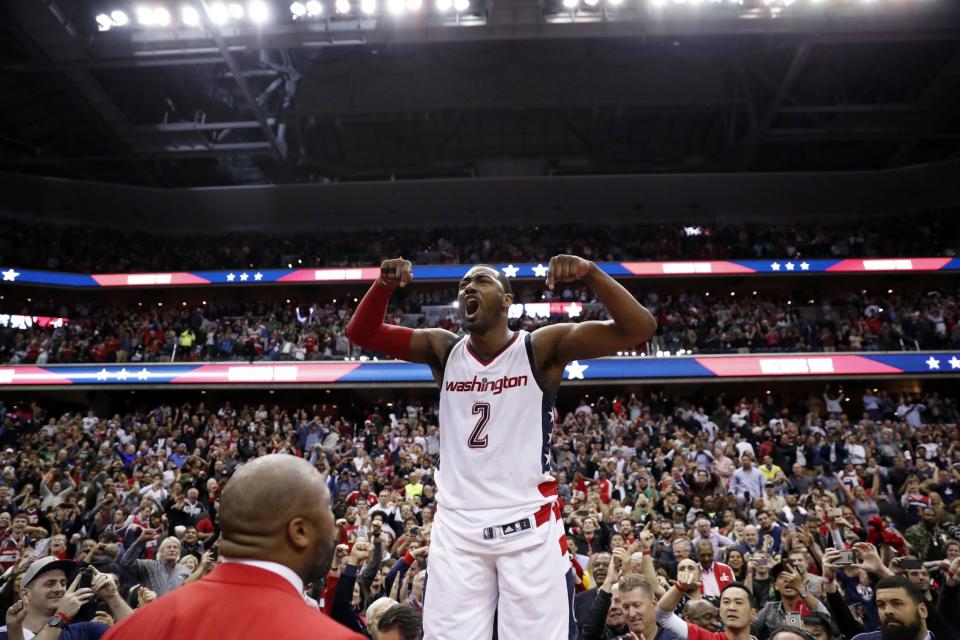What's been the best non-Cavs/Warriors part of the 2017 NBA playoffs?

OK, OK, OK: so these 2017 NBA playoffs haven’t been the most exciting in recent memory.
We’ve heard the complaints about drama-free series full of tough-to-stomach blowouts leading to a conclusion so predictable that nearly everybody in the NBA-watching world predicted it: a third straight NBA Finals matchup between the Golden State Warriors and Cleveland Cavaliers, a rubber match between the last two NBA champions. What comes next promises to be incredibly compelling, but what’s come so far … well, let’s just say it hasn’t always titillated.
[Fantasy Football is open! Sign up now]
That doesn’t mean we should throw the baby out with the bathwater, though! (In fact, as a general rule, baby-throwing should probably be kept to a minimum.) There have been some cool things about the 2017 NBA playoffs that have nothing to do with LeBron James, Stephen Curry, Kyrie Irving, Kevin Durant, Kevin Love and the rest of the gang. The topic for this pre-Finals week’s Four Corners roundtable: What’s been your favorite non-Cavs-or-Warriors thing about the 2017 postseason?
Here are our picks. Let’s hear yours in the comments.
***

Isaiah Thomas’ heart
When the final buzzer sounded on the Boston Celtics’ 2016-17 season, LeBron James sought out Celtics point guard Isaiah Thomas. LeBron hadn’t seen the 5-foot-9 (if that) All-Star since he left Game 2 with a torn hip labrum that may require surgery. It was the final straw of a monthlong stretch in which Thomas lost his sister on the eve of the first round and took an elbow to the face in Game 1 of the conference semifinals that cost him three teeth and required a dozen hours of oral surgery.
On the night LeBron passed Michael Jordan to become the leading scorer in playoff history, reaching a seventh straight NBA Finals, he wanted to pay his respects to Thomas.
“Family is everything, and basketball comes second after family,” said James. “And to see him perform the way he was performing throughout the playoffs under the circumstances was a treat to watch.”
#Respect. @celtics pic.twitter.com/ZHyESwif9E
— Cleveland Cavaliers (@cavs) May 26, 2017
The diminutive Thomas accomplished more on a basketball court this season than anybody his height ever has, and he did so while bearing a burden that would debilitate most men twice his size. Before each game this postseason, Thomas would sit at his locker, headphones silencing the noise around him, and write “R.I.P. Lil Sis,” her name “Chyna” and “I Love You” on his sneakers for the night.
During one stretch of these playoffs, Thomas delivered the eulogy at his sister’s funeral on a Saturday, dropped 33 points and nine assists despite losing his teeth in a Game 1 victory against the Washington Wizards on Sunday, underwent 10-plus hours of surgery on his mouth on Monday and scored 53 points in a come-from-behind overtime win in Game 2 on Tuesday.
As I wrote at the time, he had scripted his masterpiece: “These last few weeks have thrown everything they could at Isaiah Thomas. His heart is wrenching, and his face is wearing the pain in more ways than one. But he is still standing, still fighting, still winning. He will live with these last 17 days for the rest of his life, and he’s making sure we won’t forget, either.”
Ten days later, he reaggravated the hip injury he first suffered in March, only to hit the Wizards with 29 points and 12 assists in a Game 7 victory in his next outing. The swelling in his hip became such a concern through six quarters of the conference finals that team doctors shut him down for fear of “long-term damage.” And Thomas still asked back in.
His absence undoubtedly cost the Celtics a shot at extending the conference finals in Game 4, what with no other player scoring more fourth-quarter points than Thomas this season. Considering all he had been through, it was a shame Thomas couldn’t finish these playoffs on his own terms. But you can watch this game forever and never see heart like that again. — Ben Rohrbach
***
LeBron James’ restructuring
It’s unfair to rank something that is a direct result of the Cavaliers’ staying power as the best part of life outside the world that the Cavs and Warriors currently dominate, but that’s what we’re left with in these terrible playoffs. Things have been so bad throughout this blowout-strewn April and May that the once-tiresome LeBron vs. MJ discussions actually became interesting. Not because LeBron edged any closer to (or risen above) MJ, but because the landscape has been so bland.
More interesting, and certainly more substantial that what [ENTER 1989 FAMOUS NBA GUY HERE] thinks about LeBron vs. Michael, has been the swift and determined run of general manager modifications in the East in the wake of LeBron’s 12-1 run through the conference. Teams in James’ path, past or present, either decided to make a change at the top of their front-office ordering list, or have their still-standing general managers make declarative statements as to the acknowledged future of their clubs in LeBron’s World.
[Follow Ball Don’t Lie on social media: Twitter | Instagram | Facebook | Tumblr]
The Pacers were first, watching as Larry Bird decided he’d had enough after a first-round sweep while pushing for what could be a massive rebuild under new GM Kevin Pritchard, with All-NBA voting clouding Paul George’s future with the club. James’ second-round conquests in Toronto openly mused about the wisdom of keeping together the sort of roster that would roll over so blandly in the face of the Cavaliers.
Boston GM Danny Ainge just about signed off on keeping the 2017 draft’s No. 1 pick after winning it earlier in May. In doing so, while essentially lauding what will be the next year or two of Isaiah Thomas’ prime, Ainge acknowledged that his team’s move to the top of the East was less an indicator that the team was title-ready than, well, mostly just one of those years. (Like when the C’s made the conference finals in 2002 before winning 44 games in 2003, or took LeBron’s Heat the distance in the 2012 ECF before dipping to 41 wins in 2013 due to age, injuries and defection.) Ainge trusts both himself and (likely) Markelle Fultz’s future enough to bide time and sustain a winner until LeBron’s Age is over.
On the fringe, the Orlando Magic fired their GM in a move that needed to happen, even though doing so meant having to acknowledge that the last five years under Rob Hennigan wouldn’t have ever resulted in a Eastern title even if the now-ex-exec had gotten everything right. The Atlanta Hawks’ ownership group pushed back on coach Mike Budenholzer and ex-GM Wes Wilcox calling the shots after the team went 0-8 in its playoff work against LeBron’s Cavaliers. Chicago Bulls fans, on the other hand, are furious that the front office of John Paxson and Gar Forman will return ready to toss up the same uninspired lineup again in 2017-18, certain that such an approach is tantamount to a sweep-in-waiting for James and company.
Though we hope to once again return to a world that makes LeBron vs. Jordan discussion tiresome yet again, a major comparison remains. The unrelenting tumult in the NBA’s front-office scene in the 1990s was a direct result of MJ’s ceiling (and roof). LeBron just caused the same sort of upheaval in a month.
Bob Myers is in trouble. — Kelly Dwyer
***

John Wall’s leap
John Wall’s career certainly was not a failure before this season. The No. 1 pick in the 2010 draft had made three straight All-Star teams, been named to one All-Defensive Second Team, and won two playoff series. Plenty of quality players never reach those accomplishments in their first six seasons.
Yet something seemed lacking for a player who had come to the Wizards with such high expectations. Wall’s biggest proponents didn’t see him as just another future star point guard when he entered the league; he was supposed to be a franchise-altering player with the potential to remake the position in his hyper-athletic image. Instead, he’d become just another excellent player who couldn’t entirely marry his athleticism with the abilities necessary to impose his will on a game.
Wall stepped up his game all season, but the playoffs were his coming-out party. He was without doubt the best player in the Wizards’ first-round elimination of the Hawks, and nearly engineered the close-out win by himself. Wall wasn’t as dominant in the Eastern Conference finals against the top-seeded Celtics, but he was responsible for the vast majority of Washington’s best moments and would have had a reasonable claim to being the best player in the series if not for a very poor finish to the Game 7 loss. The Wizards didn’t make the franchise’s first conference finals since 1979, but that wasn’t Wall’s fault. He’s the guy who got them within one game of that feat.
Plus, few players were more fun to watch all season. Wall has always been a highlight machine, a frequent source of chasedown blocks and eye-opening open-court finishes. Yet it’s Wall’s animating creativity that makes his athleticism so special. At his best, he seems to conjure up a whole new way of crossing up a hapless defender or even just getting to a particular spot on the floor. In a postseason full of predictability, Wall always offered the possibility of something we’d never seen before. — Eric Freeman
***
Kawhi Leonard, proving it
In early March, as the regular season started to wind down and the postseason hierarchy became increasingly clear, the San Antonio Spurs forward turned in a brilliant performance capped by a brief burst of both-ends-of-the-court dominance to beat James Harden and the Houston Rockets:
KAWHI LEONARD FULL SEQUENCE pic.twitter.com/56NbPYJb0Q
— nbaayy (@nbaayy) March 7, 2017
That performance, coming as it did in a marquee game against an MVP frontrunner in Harden, made at least a few NBA writers and commentators wonder whether Leonard — the guy averaging 26.3 points per game and flirting with entry into the 50-40-90 Club from the floor as a First-Team All-Defense-caliber stopper for a 49-13 squad that ranked in the top five in both offensive and defensive efficiency — might be worth MVP consideration himself. This was met with resistance from those who argued that Leonard’s offensive bona fides paled in comparison to those of premier creators like Harden and Russell Westbrook, and that Leonard’s defensive gifts aren’t nearly as valuable as the superior offensive production provided by players like Harden, Westbrook, Thomas and LeBron James.
Even one of the national awards voters to cast his MVP ballot for Leonard, ESPN.com’s Zach Lowe, sounded skeptical about Kawhi’s capacity to shoulder that kind of offensive load:
Leonard isn’t the best player, or the most dominant scorer. He may not have an extra playoff gear on offense. He probably won’t win a postseason game by scoring 12 points in the final three minutes.
So, about that:
Game 2 of the opening round against the Memphis Grizzlies: 37 points on 14 shots, with 12 points coming in the last 9 1/2 minutes to ice the win.
Game 4: 43 points in 44 minutes, including San Antonio’s last 16 over the final 5:30 of regulation to bring the Spurs back, and two 3-pointers in the final 22 seconds of overtime that would’ve carried the Spurs to victory had it not been for Marc Gasol’s last-second game-winner.
Game 5: 29 points, a big late steal and two key late assists to help close Memphis out. After the game, Spurs coach Gregg Popovich called Leonard “the best player in the league right now.” At that moment, it wasn’t exactly a hot take.
Leonard averaged a shade under 24 points, 10 rebounds and six assists in the Spurs’ Round 2 win over Houston, but missed the deciding Game 6 after suffering a left ankle sprain late in Game 5. He was deemed ready to go for Game 1 of the Western Conference finals against the two-time-defending conference champion Warriors, a team featuring four All-Star performers expected to romp over the comparatively thinner Spurs … and holy hell, did he take it to them.
Leonard went into Oracle Arena and punched the West’s No. 1 seed in the mouth, taking what he wanted en route to 26 points, eight rebounds, three assists and a steal, staking visiting San Antonio to a 23-point lead. And then, Zaza Pachulia closed out one step too far, and Kawhi came crashing down on that balky ankle, and he and the series would be lost. In Leonard’s 24 conference finals minutes, the Spurs outscored the Warriors by 21 points. In the 168 without him, Golden State blitzed San Antonio by 85.
Kawhi still leads the postseason in Player Efficiency Rating — 31.7, tied for the ninth-best mark in NBA playoff history — and trails only LeBron in Win Shares and Value Over Replacement Player. He did take on an even bigger offensive role this postseason, and he aced the test, averaging nearly 28 points per game on superb efficiency with a microscopic turnover rate. He got his teammates involved and took over when necessary, and still played elite defense along the way. He was downright breathtaking to watch.
I’m not saying Westbrook wasn’t the MVP. I’m not saying defense matters exactly as much as offense. I’m not saying Kawhi’s better at what he does than Russ, Harden or LeBron are at what they do. But anyone who might have wondered before the postseason why Leonard’s one of the three finalists for this year’s MVP award should have absolutely no doubt now. He’s not just too-clever-by-half pseudo-intellectual counterprogramming. He’s the whole f’n show. — Dan Devine
More NBA coverage:


